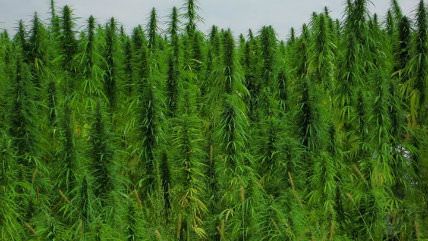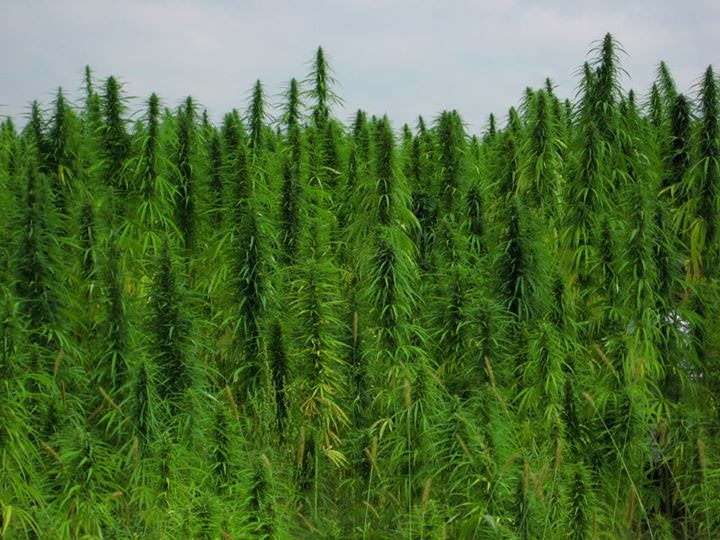Senators Tell DEA to Stop Messing With State Hemp Crops
Provisions prevent feds from spending on interference with state hemp-farming programs or hemp crop transport.


American-grown hemp may get another boost from Senate Majority Leader Mitch McConnell. Last Friday, the Kentucky Republican added a provision to the agriculture appropriations bill to help hemp farmers transport crops across state lines sans federal interference. "Kentucky's industrial hemp pilot programs continue to prosper," said McConnell, "and I want to make sure our legal hemp producers can safely transport their crops between states, including to states that maintain processing facilities, so they can fully capitalize on the commercial potential for this commodity."
Kentucky has been running an industrial hemp pilot program since last year, when the 2014 Farm Bill gave universities and state agricultural commissioners authority to grow hemp for the first time in more than half a century. Cultivating the plant on American soil was banned in 1937—owing to nothing more than hemp being in the same plant family as marijuana—and hemp's growth is still only permitted by these limited actors.
This is a shame, since hemp has all sorts of interesting potential as a building material, textile, food, cooking oil, cosmetic ingredient, and fuel source. The market for hemp seed and fiber—all imported right now—is already $600 million a year in America. Unlike marijuana, hemp does not have psychoactive properties.
Scientists at the University of Minnesota recently identified a single gene responsible for the differences between the Cannabis cousins. Plant biologist and study author George Weiblen hopes the discovery of may help hemp producers' in their quest to define the two as legally distinct. As it stands, it's even hard for researchers to study hemp because of its classification as a Schedule One controlled substance—Weiblen's lab is one of the few in the country with a federal clearance to study Cannabis of any sort, including hemp.
"It's a plant of major economic importance," said Weiblen, "that is very poorly understood scientifically. With this study, we have indisputable evidence for a genetic basis of differences among Cannabis varieties, further challenging the position that all Cannabis should be regulated as a drug."
Even after the Farm Bill authorized industrial hemp farming last year, the U.S. Drug Enforcement Administration (DEA) still tried to obstruct state efforts. In May 2014, "Customs and Border Patrol agents, acting under instructions from the DEA, seized 250 pounds of hemp seeds from Italy and China intended for pilot farming projects in Kentucky," Jacob Sullum noted. "The feds backed down only after Kentucky's agriculture commissioner filed a lawsuit."
Last month, McConnell worked with Sens. Jeff Merkley (D-Ore.) and Jon Tester (D-Mont.) to insert language into the Commerce, Justice, and Science Appropriations bill that bars the DEA from interfering with state hemp-growing programs. The language McConnell added to the fiscal year 2016 Agriculture Appropriations Bill bars the federal government from spending any money to stop the "transportation, processing, sale, or use of industrial hemp… within or outside the State in which the industrial hemp is grown or cultivated." Both bills have passed the Senate Appropriations committee and should go to the Senate floor soon, through the appropriations process may be stalled by partisan disagreements.
At least fourteen states (California, Colorado, Connecticut, Indiana, Kentucky, Maine, Montana, North Dakota, Oregon, South Carolina, Tennessee, Vermont, Virginia, and West Virginia) have now established commercial industrial hemp programs and seven (Delaware, Hawaii, Illinois, Michigan, Nebraska, New York, and Utah) have passed laws allowing hemp growth for agricultural or academic research purposes. In January, McConnell and fellow Senator Ron Wyden (D-Ore.) introduced a bill to amend the federal Controlled Substances Act to entirely exclude industrial hemp from the definition of "marihuana," but that legislation has yet to go anywhere.


Show Comments (57)